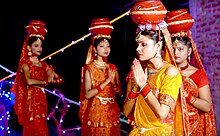 Women performing Jhijhiya dance | |
| Native name | झिझिया ঝিঝিয়া |
|---|---|
| Genre | Folk dance |
| Instrument(s) | Manjira, Dhol |
| Origin | Mithila region |
Jhijhiya (also called Jhijhari) is a cultural folk dance originating in Mithila region India and Nepal.[1] It is performed during the Dusshera festival, in the Hindu month of Ashwin (September/October). The dance is performed to offer devotion towards goddess Durga—the goddess of victory as well as to protect one's family, children and society from witches and dark magic.[2]
It is performed for ten consecutive evenings, from the day of Ghatasthapana to Bijaya Dashami, by women and girls, in a group of five to fifteen, by placing earthen pitcher on their head and dancing in a rotation manner. Inside the pitcher a fire lamp is place and multiple holes are made on the pitcher. It is believed that if a witch is successful in counting the holes on the pitcher, the dancer dies immediately.
It is also performed by Tharu people of Mithila.[3]
- ^ "झिझिया लोक अनुष्ठान सुरू". Setopati (in Nepali). Retrieved 28 October 2022.
- ^ "सिरहामा झिझिया नृत्यको रौनक शुरू". Lokaantar (in Nepali). Retrieved 27 September 2022.
- ^ "Jhijhiya in Nepal".